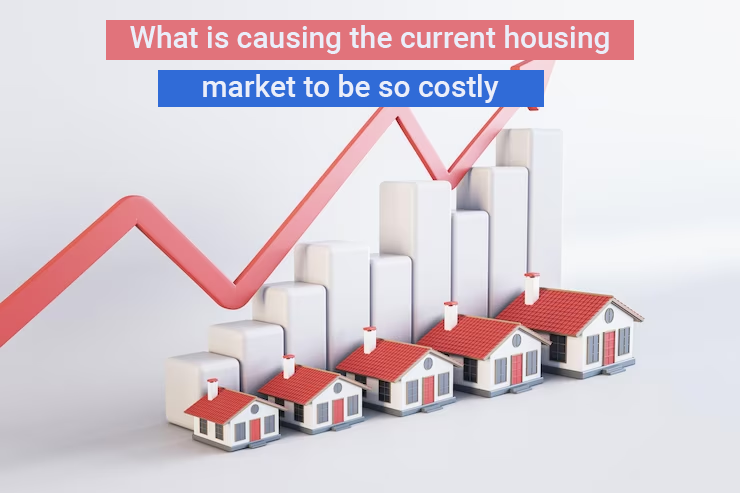What is causing the current housing market to be so costly?

In recent years, the housing market has encountered an unprecedented surge in lodging costs, leaving numerous planned homebuyers and leaseholders astounded and stressed over the moderateness of lodging.
This article means to dig into the variables that are adding to the ongoing real estate market’s extravagant expenses. We’ll investigate different components, from organic market elements to financial variables and government strategies, to acquire a complete comprehension of this major problem. What is causing the current housing market to be so costly?
Table of Contents
What is causing the current housing market to be so costly?
1. High Demand for Housing
The first and most huge component driving up lodging costs is the steady interest for homes. Populace development, urbanisation, and a deluge of individuals moving to urban areas have made a flood in the quantity of people looking for lodging. This appeal comes down on the real estate market, prompting serious offering and swelled costs.
2. Limited Housing Supply
While request is taking off, the inventory of lodging units has battled to keep pace. This lopsidedness among organic market has escalated contest among purchasers and leaseholders. Factors like drafting guidelines, land shortage, and development bottlenecks have all added to the restricted stockpile of lodging.
3. Low Interest Rates
Generally low-loan costs set by national banks have made getting cash more reasonable. This has boosted more individuals to enter the real estate market, as they can protect contracts with lower regularly scheduled instalments. In any case, this expanded interest further worsens the moderateness issue.
4. Speculation and Investment
Numerous people are putting resources into land, seeing it as a worthwhile chance for abundance gathering. This speculative way of behaving can drive up costs misleadingly and make lodging bubbles, where costs far surpass the inherent worth of the properties.
5. Rising Construction Costs
Development materials and work costs have been on the ascent, making it more costly to assemble new homes or embrace critical redesigns. These expanded costs are frequently given to homebuyers, adding to higher generally speaking lodging costs.
6. Government Regulations
Government strategies and guidelines assume a huge part in the real estate market’s elements. Drafting regulations, construction standards, and land-use guidelines can confine lodging improvement, further restricting stock and expanding costs.
7. Economic Factors
Monetary circumstances, like expansion and compensation stagnation, can influence lodging moderateness. At the point when wages don’t stay up with rising lodging costs, it turns out to be progressively challenging for people and families to bear the cost of homes.
8. Geographic Factors
Geographic area likewise assumes a vital part in lodging costs. Significant metropolitan regions and districts with popularity for lodging frequently experience more significant cost expands contrasted with country regions.
9. Pandemic-Driven Changes
The Coronavirus pandemic has reshaped lodging inclinations, with additional individuals looking for bigger homes or moving to rural regions. This change sought after has placed extra tension on specific real estate markets.
10. Foreign Investment
Unfamiliar financial backers, looking for stable speculations and places of refuge for their capital, frequently put resources into housing markets abroad. Their presence can drive up costs in advantageous regions, making lodging more expensive for local people.
11. Lack of Affordable Housing Initiatives
Deficient endeavors to make reasonable lodging choices can intensify the issue. Numerous people group battle to give lodging choices that take care of lower-pay people and families.
12. Real Estate Market Cycles
The housing market works in cycles, with times of win and fail. Current economic situations might be affected by where we are in the cycle, with appeal and costs driven by speculative movement.
13. Supply Chain Disruptions
Ongoing disturbances in worldwide stock chains have affected the accessibility and cost of development materials, further driving up lodging costs.
14. Environmental Concerns
Expanded familiarity with natural supportability has prompted higher development norms and energy-proficient plans. While these are positive turns of events, they can add to the underlying expense of building or purchasing a home.
15. Lease Control and Occupant Securities
In some regions, rent control and tenant protection laws have been implemented to mitigate rising housing costs. However, these measures can have unintended consequences, such as discouraging landlords from investing in property maintenance and new construction.
In conclusion, the current housing market’s high costs are the result of a complex interplay of factors, including surging demand, limited supply, economic conditions, government policies, and more. Addressing this issue requires a multifaceted approach, including efforts to increase housing supply, improve affordability initiatives, and carefully monitor market speculation. As the housing market continues to evolve, finding sustainable solutions to make housing more accessible and affordable remains a pressing concern.
FAQ’s
1. Are lodging costs expected to keep ascending soon?
A. While it’s trying to anticipate with conviction, numerous specialists accept that lodging costs might keep on ascending in the present moment because of continuous interest and supply imperatives. Nonetheless, long haul patterns might shift.
2. How could first-time homebuyers explore the high lodging costs?
A. First-time homebuyers ought to think about putting something aside for a bigger up front instalment, investigating reasonable lodging projects, and working with experienced realtors to track down reasonable choices.
3. Do government impetuses exist to advance reasonable lodging?
A. Indeed, numerous states offer impetuses, for example, tax breaks and sponsorships to support the improvement of reasonable lodging projects.
4. What effect has remote work had on lodging costs?
A. Remote work has affected lodging costs by provoking a few people to look for lodging in more affordable regions or put resources into home moves to oblige remote work needs.
5. Are there any signs of a housing market bubble?
A. A few locales have given indications of a theoretical way of behaving, however whether an all out lodging bubble exists is a subject of discussion among specialists. It is fundamental for Screen economic situations.



